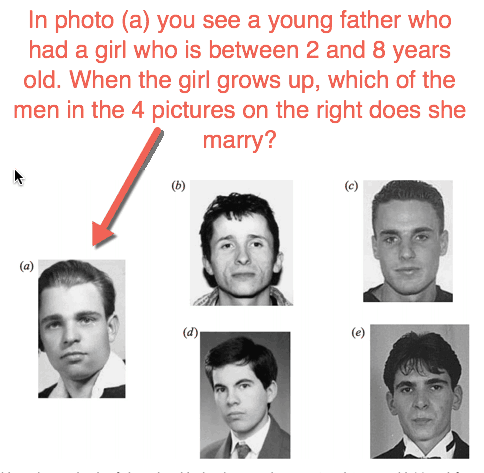
Why is a woman attracted to John, but not Jim?
Why does a woman pair up with Joe, but not George?
Can you answer this question:

Researchers have attempted to answer this question in many different ways.
This is one of the most clever ways.
There’s a phenomenon called sexual imprinting.
Sexual imprinting is when you bond with your opposite sex parent.
That bond then determines the traits of that opposite sex parent that will become the traits that you look for in your spouse.
This study set out to determine exactly how this sexual imprinting affects a woman’s choice of husband.
The researchers wanted to know what makes a woman attracted to a certain type of man as a husband.
They chose to use adopted women.
These women had all been raised by adoptive parents.
That eliminated any genetic biases in the study.
So here’s what they did.
Researchers sent the women into a room with pictures of people that the women didn’t know.
The women then had to choose photo matches for specific scenarios.
They had to choose a possible husband in some scenes.
Other scenes required the women to match up with possible fathers.
There was another really clever trick to help control the results.
The pictures had all been Photoshopped to remove outside biases.
So the faces were edited to make all of their positions the same.
Complexions were edited to remove racial identities.
And the exposure levels of all of the photos were made the same.
All of these steps ensure that ONLY the facial features would enter into the decision process.
What they found is facsinating!
 First of all, husbands and wives resemble each other.
First of all, husbands and wives resemble each other.
Not just a little, but a lot.
And the resemblance is way above what just chance would provide.
So people seek out mates that are similar to them in many ways.
The researchers also found that genetics didn’t affect the choices the women made in choosing a “husband” photo.
But being close to her adoptive father did affect her choice.
She was much more likely to seek out a husband similar to her adoptive father if she was close to him.
If the daughter was not very close to the father when growing up, she was NOT likely to pick a man that was similar to her adoptive dad.
How dads behave imprints on their daughters and affects their choice of husband.
It was only when she was really close to her adoptive father that she sought out a husband was similar to her adoptive father.
If you recall just recently, I showed you a study that showed men to be more attracted to women who were dissimilar to them as far as their MHC, or major histocompatibility complex.
In other words men were more attracted to women who are dissimilar to themselves.
So isn’t this study were talking about today contradictory to that one?
Not really.
In today’s study, men and women who married were more likely to be similar in looks.
But that doesn’t mean that their MHC is the same.
It is quite common for people to marry within their ethnic group, or within their socioeconomic or local group.
They’re likely to be marrying someone who is at least distantly related that way.
But the relation is distant enough that the MHC wouldn’t block the attraction.
This study shows that women definitely prefer men who are visually similar to their fathers — if the woman was close to her father.
They’re also likely to be attracted to men with the same qualities as their father.
And by the way, the answer to the question I asked at the beginning of this newsletter is (d).
Citations
Sexual imprinting in human mate choice
http://rspb.royalsocietypublishing.org/content/271/1544/1129.short
See this for more on Relationships and see more on Vitality and Relationships, and for more information see effects of Eating healthy
